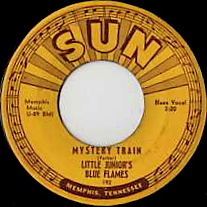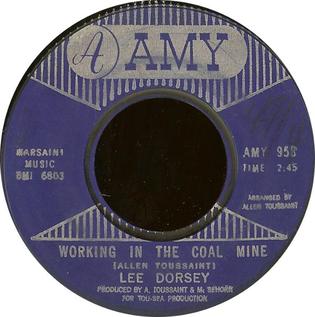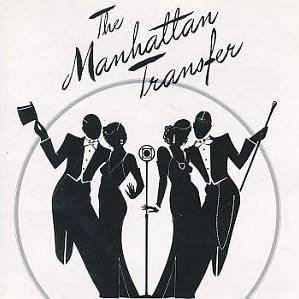Related Research Articles

Allen Richard Toussaint was an American musician, songwriter, arranger, and record producer. He was an influential figure in New Orleans rhythm and blues from the 1950s to the end of the century, described as "one of popular music's great backroom figures." Many musicians recorded Toussaint's compositions. He was a producer for hundreds of recordings: the best known are "Right Place, Wrong Time", by longtime friend Dr. John, and "Lady Marmalade" by Labelle.

"Mystery Train" is a song written and recorded by American blues musician Junior Parker in 1953. Originally performed in the style of a Memphis blues or rhythm and blues tune, it was inspired by earlier songs and later became a popular rockabilly song, as first covered by Elvis Presley, then numerous others.

Moondog Matinee is the fifth studio album by Canadian/American rock group the Band, released in 1973. It consists entirely of cover material reflecting the group's love of R&B and blues music, with one exception in their interpretation of the theme from the film The Third Man.
"The Song from Moulin Rouge", sub-titled "Where Is Your Heart", is a popular song that first appeared in the 1952 film Moulin Rouge. It became a No. 1 hit in the UK Singles Chart when recorded by Mantovani. The music for the film was written by Georges Auric; the original French lyrics were by Jacques Larue, with the English words by William Engvick. The Auric-Engvick song was published in 1953.

Irving Lee Dorsey was an American pop and R&B singer during the 1960s. His biggest hits were "Ya Ya" (1961) and "Working in the Coal Mine" (1966). Much of his work was produced by Allen Toussaint, with instrumental backing provided by the Meters.

"Working in the Coal Mine" is a song with music and lyrics by the American musician and record producer Allen Toussaint. It was an international hit for Lee Dorsey in 1966, and has been recorded by other musicians including Devo in 1981.

The Manhattan Transfer is the second album by The Manhattan Transfer. However, it is the first of four albums to be released by the lineup of Tim Hauser, Laurel Massé, Alan Paul, and Janis Siegel, and the first to establish the sound and style for which the group would become known. It was released on April 2, 1975, by Atlantic Records and was produced by Ahmet Ertegün and Tim Hauser.

"Yes We Can Can" is a funk song written by Allen Toussaint, and first released by Lee Dorsey in 1970. It was popularized when it was recorded by the American R&B girl group the Pointer Sisters.

"Ya Ya" is a song by Lee Dorsey. The song was written by Dorsey, C. L. Blast, Bobby Robinson, and Morris Levy. Levy's participation in the writing has been called into question; the Flashback release of the single lists only Dorsey and Blast as writers, as do the liner notes to the American Graffiti soundtrack.
"Gotta Travel On" is an American folksong. The earliest known version was printed in Carl Sandburg's The American Songbag in 1927 under the title "Yonder Comes the High Sheriff" and several variations were recorded in the 1920s, but the best known version is credited to Paul Clayton, The Weavers, Larry Ehrlich, and Dave Lazer and was first recorded by Pete Seeger in 1958.

This is the discography for American R&B-jazz musician Allen Toussaint.
"What Am I Living For" is a song written by Fred Jay and Art Harris and performed by Chuck Willis featuring the Reggie Obrecht Orchestra and Chorus. It reached No. 1 on the U.S. R&B chart and #9 on the U.S. pop chart in 1958.

"Ooh Poo Pah Doo" is a song written and performed by Jessie Hill. It was arranged and produced by Allen Toussaint. The single reached No. 3 on the Billboard R&B chart and No. 28 on the Hot 100 in 1960.
"Sleep" is a song written by Earl Burtnett and Adam Geibel in 1923. The song's melody is based on a motif from "Visions of Sleep", a 1903 composition by Geibel. The song was released by Fred Waring's Pennsylvanians in 1923, becoming the band's first hit and their signature theme. The song was also the theme for the television musical variety show The Fred Waring Show. The lyrics for the song were written by Waring's brother, Tom, who sang on the recording as well.
"Rainin' in My Heart" is a song written by James Moore and Jerry West and performed by Harpo. It reached number 17 on the U.S. R&B chart and number 34 on the U.S. pop chart in 1961. It was featured on his 1961 album Slim Harpo Sings "Raining in My Heart..." It is not to be confused with the similarly titled Buddy Holly song, "Raining in My Heart".

"Get Out of My Life, Woman" is a song written by Allen Toussaint and first recorded by Lee Dorsey. It reached number five on the U.S. Billboard R&B chart and number 44 on the Hot 100 singles chart in 1966.
"The Duck" is a song written by Fred Sledge Smith and Earl Nelson and performed by Jackie Lee. It was featured on his 1966 album The Duck. The song was arranged by Fred Hill and produced by Fred Sledge Smith.
"The Men in My Little Girl's Life" is a song written by Mary Candy, Eddie Dean, and Gloria Shayne and performed by Mike Douglas. The song was arranged by Jerry Fielding and produced by Manny Kellem. It was featured on Douglas' 1966 album The Men in My Little Girl's Life.

"The World Is a Ghetto" is a song written and performed by War. The song was produced by Jerry Goldstein, and was featured on the band's album of the same name.
"People Make the World Go Round" is a song written by Thom Bell and Linda Creed, originally recorded by The Stylistics and released in 1972 through Avco Records as the final single from their self-titled debut studio album, The Stylistics (1971). It reached #25 on the Billboard Hot 100 singles chart, #25 on the Adult Contemporary chart, and #6 on the Soul Singles chart in the United States.
References
- ↑ "Lee Dorsey, "Holy Cow" Chart Positions" . Retrieved March 21, 2019.
- ↑ "Lee Dorsey, Working in the Coal Mine - Holy Cow". Discogs . 1966. Retrieved March 21, 2019.
- ↑ "Lee Dorsey, "Holy Cow" Single Release" . Retrieved March 21, 2019.
- ↑ "Buddy Lucas, Honkin' Sax". Discogs . 1967. Retrieved March 21, 2019.
- ↑ "The Band, Moondog Matinee". AllMusic . Retrieved March 21, 2019.
- ↑ "Mike Finnigan, Mike Finnigan". AllMusic . Retrieved March 21, 2019.
- ↑ "Oily Rags, Oily Rags". AllMusic . Retrieved March 21, 2019.
- ↑ "Jools Holland, "Holy Cow"". Discogs . 1990. Retrieved March 21, 2019.